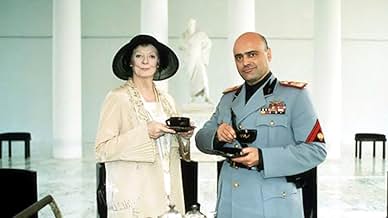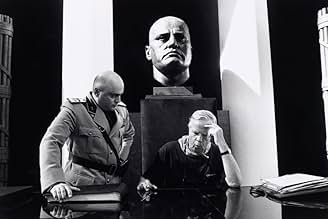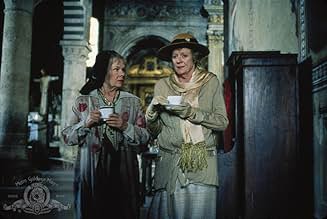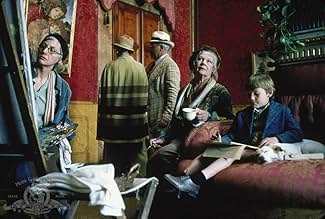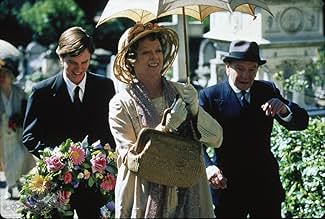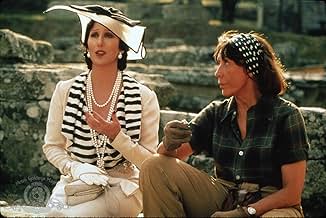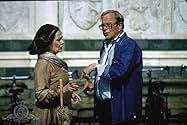AVALIAÇÃO DA IMDb
6,9/10
15 mil
SUA AVALIAÇÃO
Um menino italiano órfão é criado entre um círculo de mulheres britânicas e americanas que viveram na Itália de Mussolini antes e durante a Segunda Guerra Mundial.Um menino italiano órfão é criado entre um círculo de mulheres britânicas e americanas que viveram na Itália de Mussolini antes e durante a Segunda Guerra Mundial.Um menino italiano órfão é criado entre um círculo de mulheres britânicas e americanas que viveram na Itália de Mussolini antes e durante a Segunda Guerra Mundial.
- Direção
- Roteiristas
- Artistas
- Ganhou 1 prêmio BAFTA
- 5 vitórias e 3 indicações no total
Avaliações em destaque
This is a very European movie. Whereas Hollywood overstates, Europe understates. The story is based on the autobiography of Franco Zeffirelli, born in 1922, who became a prominent Italian stage director and achieved world fame as a director of filmed stage pieces such as "Romeo and Juliet," "Hamlet, and "La Traviata." The film deals with the years 1935-44. After the death of his mother Zeffirelli, or Luca in the film, an illegitimate child more or less rejected by his father, was looked after by a group of eccentric art-loving English ladies who had made Florence their home - on their terms. The locals call them the "Scorpioni" - a tribute to their acid tongues. When Mussolini declared war on Britain in 1940, the ladies were interned in a beautiful mountaintop village near Florence, guarded by a couple of long-suffering policeman, their lifestyle of sketching, painting, art appreciation and fine dining scarcely changing.
The setting is the Florentine treasure troves of Tuscan art, the Uffizi, Il Duomo and the Academy. The English are led by three grand dames of the theatre, Joan Plowright as Arabella, Luca's chief protector, Maggie Smith, and Judy Dench (with her real life husband Michael Williams in a supporting role as the British consul.). Then there are two equally larger than life Americans, a retired but still glamorous movie star played by Cher, and a bike-riding lesbian archaeologist played by Lily Tomlin. Most of the Italian characters are overshadowed by all this Anglo ego. (Or maybe it's just poor dubbing, or John Mortimer's part in the scriptwriting). The two boys playing Luca at different ages are good looking but the older one in particular is a bit vacuous, and Cher's impossibly handsome Italian boyfriend puts in a wooden performance.
There are a couple of plot-lines (will Cher escape the Jewish round-up, will the ladies make it through the war OK) and the occasional funny scene but the interest is really in the characters. Not that all of them are particularly attractive people. Maggie Smith's Lady Hester, widow of a former British Ambassador to Italy, is a dreadful old snob with hardly any brains who likes the fascists and has scarcely a good word for anybody else except her late husband. She engineers the tea party with Il Duce, fondly imagining that Mussolini himself will ensure the ladies' safety in Florence. A few days later the local fascists tip them out of the Uffizi gallery where they were accustomed to take tea while they sketched the old masters. Yet at the end she does show a little genuine good grace when she intervenes to help Cher.
It's a curious piece, reminiscent of "Life is Beautiful" - a light comedy with a deadly serious titanic struggle between good and evil going on in the background, a background which seems altogether too gorgeous to accommodate such evil. Good, represented by a Scottish major, triumphs in the end, only to be put in his place by the Scorpioni. Zeffirelli here pays his artistic and personal debt to them. Wacky though they were, the Scorpioni did know the difference between good and evil, or at least the difference between good art and bad art, and they taught Zeffirelli well.
The setting is the Florentine treasure troves of Tuscan art, the Uffizi, Il Duomo and the Academy. The English are led by three grand dames of the theatre, Joan Plowright as Arabella, Luca's chief protector, Maggie Smith, and Judy Dench (with her real life husband Michael Williams in a supporting role as the British consul.). Then there are two equally larger than life Americans, a retired but still glamorous movie star played by Cher, and a bike-riding lesbian archaeologist played by Lily Tomlin. Most of the Italian characters are overshadowed by all this Anglo ego. (Or maybe it's just poor dubbing, or John Mortimer's part in the scriptwriting). The two boys playing Luca at different ages are good looking but the older one in particular is a bit vacuous, and Cher's impossibly handsome Italian boyfriend puts in a wooden performance.
There are a couple of plot-lines (will Cher escape the Jewish round-up, will the ladies make it through the war OK) and the occasional funny scene but the interest is really in the characters. Not that all of them are particularly attractive people. Maggie Smith's Lady Hester, widow of a former British Ambassador to Italy, is a dreadful old snob with hardly any brains who likes the fascists and has scarcely a good word for anybody else except her late husband. She engineers the tea party with Il Duce, fondly imagining that Mussolini himself will ensure the ladies' safety in Florence. A few days later the local fascists tip them out of the Uffizi gallery where they were accustomed to take tea while they sketched the old masters. Yet at the end she does show a little genuine good grace when she intervenes to help Cher.
It's a curious piece, reminiscent of "Life is Beautiful" - a light comedy with a deadly serious titanic struggle between good and evil going on in the background, a background which seems altogether too gorgeous to accommodate such evil. Good, represented by a Scottish major, triumphs in the end, only to be put in his place by the Scorpioni. Zeffirelli here pays his artistic and personal debt to them. Wacky though they were, the Scorpioni did know the difference between good and evil, or at least the difference between good art and bad art, and they taught Zeffirelli well.
This film is directed and co-authored by Franco Zeffirelli, and I couldn't resist speculating on how much of it was actually true, since it is said to be based on Zeffirelli's autobiography. However, true in part, true completely, in the end it doesn't really matter. What matters is the amazing ensemble acting by Maggie Smith, Cher, Joan Plowwright, Judi Dench and Lily Tomlin (listing them in the order of significance to the story) and the stunning beauty of Florence where the film is set. The director and photographer plainly love the city, matching the love for it of the characters. Maggie Smith as the widow of a former British ambassador, the character that actually has tea with Mussolini, is the dominant figure in the film. However, Cher, playing a wealthy American -- vulgar in the eyes of he British ladies -- who turns out to be a complex, philanthropic Jew who must be smuggled out of the country in the end; Joan Plowwright as a kind lady who takes in the bastard son of an Italian businessman and teaches him to be an English gentleman; Judi Dench as an eccentric artist whose passion is to preserve a renaissance fresco from the Nazis during the war, and Lily Tomlin as a lesbian American archaeologist all deliver sterling performances. Cher's performance is the most amazing -- she holds her own in formidable company -- but one expects, of course, to be dazzled by Maggie Smith, Joan Plowwright, Judi Dench and even by Lily Tomlin. It's a sentimental, even melodramatic, tale, but see it for the ensemble acting. I can't think of another film that equals Tea with Mussolini in that respect.
This film is one of the most touching and lovely films that I have seen in many years. Its gaggle of actresses are second to none and turn out excellant performance, Joan Plowright in particular brings an irresistable sweetness to the role. People who have commented on the film so far seem to have neglected to mention the soundtrack which is beautiful and inspiring with a wonderful piano piece. Criticism that the film is too old fashioned or that the characters are unappealing and pompous seems to miss the point, the very charm of Hester (Maggie Smith in particular)is how she overcomes her snobbery at the end and realises how much Elsa (Cher, who in any other film would doubtless be misplaced but in this case fits the role like a glove) has done for the Scorpioni. In short the film is a relic of a gentler age and is simultaniously uplifting, upsetting and relaxing. I implore everyone to hunt down the soundtrack on CD to the ends of the earth if necissary.
After nearly 20 years as a top pop and television star, Cher suddenly skyrocketed to film stardom in the mid-80's, walked off with an Academy Award, ranked among the top ten box-office stars and just as suddenly disappeared from the big screen in 1991 after one last hit "Mermaids"(1990) cleaned up at cinemas. In 1999 she made a tremendous comeback with a multimillion selling CD "Believe"(Warner Bros, 1998) and most impressively returned to the big screen with a luminous performance in Franco Zefferelli's "Tea With Mussolini"(MGM,1999). Reviews were mixed but after I saw this in the movie theater, I felt the film was rather good. Based on an autobiography by Zefferelli recounting his early years trying to survive the Nazi-Mussolini atrocities of WWII. During this dangerous time Zefferelli was protected by a coterie of socialite dowagers played splendidly by Maggie Smith, Judi Dench, Joan Plowright, Lily Tomlin and of course Cher who was perfectly cast as a gorgeous Jewish chanteuse. The story has some holes and the film was probably edited down too much for its US release that cause some continuity issues but this is overall a charming, thoughtful period piece highlighted by Cher at her latter day peak. Shame this success did not resuscitate her dormant film career. She has made nothing of note since.
It's certainly not clear how fictionalized a version of Zeffirelli's autobiography "Tea With Mussolini" is, what with the usual disclaimers at the end. Even presuming this is just a riff off an incident in his life, that he had some contact with memorable English ladies, it's clearly his tribute to where his love of English literature comes from, particularly Shakespeare. He's done several Shakespeare interpretations-- movies, opera and play directing. The film has a lovely scene of him being first introduced to acting out "Romeo & Juliet" with puppets, as well as constant quotes from Shakespeare throughout about war and his situation.
I was surprised how good the movie was - I was in tears several times, especially with visuals that bring up the same comparisons as "The Train" did, with art vs. war, humanity's heights of creativity vs. its lows of prejudice and violence.
These Oscar-winning ladies are absolutely terrific, yes including Cher. One elderly gentleman behind me complained that Maggie Smith basically always plays the same character but I thought her character does change towards the end. The others were certainly not their usual on-screen personas, Judi Dench as a free-spirited artist, Joan Plowright as a quite warm-hearted grandmotherly type, and Lily Tomlin a hoot as a butch archaeologist.
But why choose bland Italian actors for them to play off of? To make the Scorpioni, as they are called, stand out more? The Italians seemed stereotyped to me, Latin lover, ignorant peasants not appreciating their ancient artistic heritage.
What the movie also brought to mind is how few Italian movies have dealt with their fascist past as much as the French have been exploring their consciences of collaboration in film. Sure "Garden of Finzi Continis," "Two Women" and "Life Is Beautiful" show arrests, etc. but I don't get the sense of soul searching as to how did this happen here and could it again? Just because they didn't have Shakespeare and appreciate the treasures of the Uffizi as this film implies? (originally written 5/15/1999)
I was surprised how good the movie was - I was in tears several times, especially with visuals that bring up the same comparisons as "The Train" did, with art vs. war, humanity's heights of creativity vs. its lows of prejudice and violence.
These Oscar-winning ladies are absolutely terrific, yes including Cher. One elderly gentleman behind me complained that Maggie Smith basically always plays the same character but I thought her character does change towards the end. The others were certainly not their usual on-screen personas, Judi Dench as a free-spirited artist, Joan Plowright as a quite warm-hearted grandmotherly type, and Lily Tomlin a hoot as a butch archaeologist.
But why choose bland Italian actors for them to play off of? To make the Scorpioni, as they are called, stand out more? The Italians seemed stereotyped to me, Latin lover, ignorant peasants not appreciating their ancient artistic heritage.
What the movie also brought to mind is how few Italian movies have dealt with their fascist past as much as the French have been exploring their consciences of collaboration in film. Sure "Garden of Finzi Continis," "Two Women" and "Life Is Beautiful" show arrests, etc. but I don't get the sense of soul searching as to how did this happen here and could it again? Just because they didn't have Shakespeare and appreciate the treasures of the Uffizi as this film implies? (originally written 5/15/1999)
Você sabia?
- CuriosidadesCher has stated that the only reason she took the part of Elsa was because Writer and Director Franco Zeffirelli said he could only see her and no other actress in the role.
- Erros de gravaçãoThe tanks the Germans ride in are, in fact, U.S. Army M4 Shermans, not German-built Panzers.
- Citações
Lady Hester: The Germans and the Italians couldn't get rid of us. There is absolutely no reason why we should surrender to the Scots.
- Versões alternativasThe MGM DVD, ISBN 0-7928-4300-2, is missing least one shot: The original tea with Mussolini scene ends with Mussolini forcing himself upon the reporter, forcing her onto his desk (i.e., he rapes her.) This DVD omits that ending and leaves the reporter's change in behavior unexplained.
- Trilhas sonorasMattinata Fiorentina
Written by Giovanni D'Anzi (as D'Anzi) and Michele Galdieri (as Galdieri)
Performed by Alberto Rabagliati
Principais escolhas
Faça login para avaliar e ver a lista de recomendações personalizadas
- How long is Tea with Mussolini?Fornecido pela Alexa
Detalhes
- Data de lançamento
- Países de origem
- Central de atendimento oficial
- Idiomas
- Também conhecido como
- Tea with Mussolini
- Locações de filme
- Empresas de produção
- Consulte mais créditos da empresa na IMDbPro
Bilheteria
- Orçamento
- US$ 12.000.000 (estimativa)
- Faturamento bruto nos EUA e Canadá
- US$ 14.401.563
- Fim de semana de estreia nos EUA e Canadá
- US$ 1.633.183
- 16 de mai. de 1999
- Faturamento bruto mundial
- US$ 14.401.563
- Tempo de duração
- 1 h 57 min(117 min)
- Cor
- Mixagem de som
- Proporção
- 1.85 : 1
Contribua para esta página
Sugerir uma alteração ou adicionar conteúdo ausente


